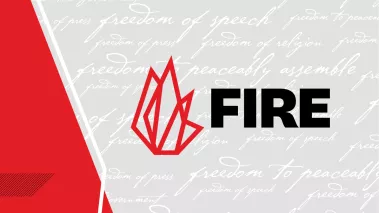Table of Contents
Freedom of speech: RIC ends the inquisition, not the debate

BROOKLYN, N.Y.
ON SEPT. 9, Rhode Island College tried to weasel out of an embarrassing free-speech controversy, in which it had tried a professor for doing nothing more than refusing to violate the First Amendment. And though RIC's decision not to proceed with "further formal action" against the professor was welcome, it did nothing to convince civil-liberties watchdogs that free speech is secure at RIC.
The professor, Lisa Church, was coordinator of RIC's cooperative preschool. In February, a pupil's mother went to her and alleged that in a private conversation another parent (both are students at RIC) had expressed racist opinions. The woman demanded that the other parent be punished.
Church refused, aware that as a teacher at a public institution she had no right to punish students for their opinions. She offered other ways to address the woman's concerns, but the woman (who is white) filed a formal complaint of "discrimination" against Church for her failure to agree to her demands.
Remarkably, RIC treated the woman's claim as valid and moved ahead with weeks of proceedings against Church. Church tried to convince the administrators that she had broken no rule, and that in her handling of the situation she had fulfilled both federal law and the policy of the preschool. But the RIC administrators made no distinction between clearly protected speech and punishable "discrimination." One of them wrote to Church: "On the college campus, certain types of remarks will not be tolerated, no matter what the intent."
The Foundation for Individual Rights in Education (FIRE) went to Church's aid. On Aug. 2, FIRE wrote RIC President John Nazarian to say that RIC's handling of the case had flatly violated the U.S. Constitution. RIC had begun with the erroneous assumption that the private expression of offensive opinions could be punished; it then went a breathtaking step further by implying that the college officials had a positive duty to punish speech that offended any student.
President Nazarian responded only after public outcry had been generated by FIRE's taking the case public. In his belated response, Nazarian defended the college's proceedings, quoting RIC regulations that the college be free of "disrespectful" or "inappropriate communication."
Amazingly, Nazarian quoted a wildly unconstitutional speech code in defense of unconstitutional proceedings against a college faculty member.
Fortunately for dissenters, nonconformists, critics and artists, our Constitution protects a broad array of speech, forbidding public officials such as Nazarian to ban anything they deem "inappropriate." It is chilling that the president of a major public college does not understand this fundamental American freedom.
Also disturbing was Nazarian's reference to another RIC policy, which not only flaunted departure from First Amendment law but also depicted curtailing free speech as noble and in accordance with a "higher order" (RIC's words) of rights.
In fact, the mindset that punishing disagreeable speech is somehow heroic is distressingly common in higher education. Administrators too often view censorship as valiant when used to spare their "fragile" adult students from hearing opinions they might dislike.
Occidental College, in California, demonstrated this attitude last spring, when it found a college-radio jock guilty of "harassment" for bawdy banter, and fired him. The Harvard Business School demonstrated this attitude when it tried to defend its threats against the editor of a student newspaper for having published a mildly critical cartoon about computer services. And at Southwest Missouri State University, administrators continue to treat a cartoon (drawn by a student of Native American descent) that picks on ungrateful Thanksgiving hosts as discrimination against Indians.
Indeed, this illiberal, paternalistic attitude dominates at the hundreds of colleges and universities across the country that, like Rhode Island College, maintain unconstitutional speech codes.
Censorship is neither noble nor enlightened. College officials are not all-knowing, and must not adjudicate which opinions may or may not be expressed. Almost without exception, the topics that our society hesitates most to discuss are the topics that it most desperately needs to address. It is far better to allow free discussion to deal with offensive ideas than to try to rid the world of unpleasantness through official fiat.
Now RIC is trying to extinguish public criticism by ending the proceedings against Professor Church and also saying that the case had nothing to do with free speech. The Rhode Island Affiliate of the American Civil Liberties Union is not fooled, FIRE is not fooled, and the state's taxpayers should not be, either. RIC has attempted to legitimize its investigation into protected speech and ignored the wildly unconstitutional speech code that made this inquisition possible.
No one who believes that freedom is a right worth defending should be satisfied with RIC's handling of this matter. Until RIC changes its policies and makes it clear that what happened to Lisa Church will not happen to anyone else, this case is not truly over.
Recent Articles
FIRE’s award-winning Newsdesk covers the free speech news you need to stay informed.

Victory in Virginia! Gov. Youngkin defends free speech by vetoing bill on ‘altered’ political media

DEI statements could function as ideological firewalls, new study finds

Is it ‘hate speech’ to say Jesus needs a haircut?
